There’s a sound war echoing through South Africa right now, and it has nothing to do with genre clashes or festival feuds. This is about music licensing—and it’s playing out not on stages, but in courtrooms. At the center? A high-stakes legal battle that could redefine how public spaces—from five-star hotels to your neighborhood café—pay for the right to play the music that shapes our memories and moments.
Welcome to the frontline of a fight that’s about more than fees. This is about power, access, and what fair compensation really means in an evolving global music economy.
The Battle Breakdown: Who’s Suing Who?
The legal storm surrounds a decades-old but newly inflamed issue: businesses like restaurants, hotels, and entertainment venues are being charged music licensing fees to play recorded music publicly. This practice isn’t new—but it’s facing fresh scrutiny, particularly as post-pandemic economic recovery collides with a music industry increasingly adamant about protecting its digital and performance rights.
At the core of the current dispute is the relationship between South African businesses and music rights organizations, particularly the Southern African Music Rights Organisation (SAMRO) and the Composers Authors and Publishers Association (CAPASSO). These collection agencies are responsible for managing the licensing and distribution of royalties when music is played in public spaces.
But lately, some venue owners and business coalitions have pushed back—hard.
Venue Owners vs. Music Rights Collectors
According to official statements, a growing number of businesses argue that the fees they’re being asked to pay are excessive, ambiguous, and in some cases, applied unfairly. Their position? They’re supporting the arts by hosting live performances and promoting music culture, not exploiting artists for profit.
But rights organizations counter with a blunt truth: music isn’t free. Whether it’s a curated playlist at brunch or background jazz in a hotel lobby, those sounds are the product of someone’s time, talent, and intellectual property. And just because it’s ambient doesn’t mean it’s exempt from payment.
In response to noncompliance and underpayment, collection agencies have ramped up legal action—taking multiple venue operators to court and seeking enforcement of what they claim are legally binding license requirements.
A System That Needs A Remix?
Zoom out, and this fight is bigger than South Africa. It’s a mirror of a global tension point: how do we modernize licensing structures so artists are paid fairly, while also creating systems that businesses can navigate transparently and sustainably?
Many small and medium business owners argue that the licensing ecosystem is overly complex and under-explained. They cite confusing categories, limited communication from rights organizations, and unclear breakdowns of where the money actually goes.
On the flip side, artists and songwriters—especially those working independently or from marginalized communities—rely on these royalties to survive. In an industry where streaming payouts are notoriously low, public performance royalties remain a vital, often underappreciated, income stream.
This isn’t just a fee—it’s rent for the emotional real estate music occupies in the daily lives of customers and guests.
Who Gets Paid, and How?
The real question pulsing beneath this court fight is one we ask often at Sunset: when a song is played, who profits—and who doesn’t?
In South Africa, SAMRO and CAPASSO license businesses to use music and then distribute royalties to composers, authors, and publishers. But transparency in that distribution process has long been a point of contention. Musicians, especially those without legal teams or industry connections, often struggle to confirm whether their work is being tracked or paid out properly.
Some venue owners, meanwhile, argue that they’d be more inclined to comply with fees if they knew the money directly reached the artists whose music they feature. As things stand, many feel disconnected from that outcome—like they’re writing checks into a black box.
What’s At Stake: Culture and Cashflow
This court case is about more than legal precedent—it’s about the soul of the South African music scene. Venues are the lifeblood of local culture, offering performance space, exposure, and sonic community to emerging and established artists alike. But if the financial burden of licensing becomes too steep or too opaque, some may reduce music programming altogether.
And in a country with one of the most vibrant musical legacies on the planet, that would be a loss felt far beyond any courtroom.
At the same time, protecting artist rights isn’t optional. It’s essential. Fair compensation ensures the survival of the creative class—and makes it possible for artists to not just create, but to live with dignity.
Where This Goes Next
The court cases are still unfolding, and any resolution could have a ripple effect across the continent—and potentially influence licensing models in other parts of the world where the rules are equally murky.
For now, South Africa finds itself at a crossroads: Can it build a licensing model that honors artists, empowers businesses, and invites the public to engage with music ethically? Or will this fight deepen the divide between culture creators and the spaces that showcase their work?
Sunset’s Take
At Sunset, we believe in a future where the business of music works for the music. That means licensing systems that are transparent, accessible, and fair on all sides. Because every song played in a restaurant, every hook that lingers in a hotel lounge—it all comes from someone’s hands, heart, and hustle.
This isn’t just about the cost of playing music. It’s about the value of it.





